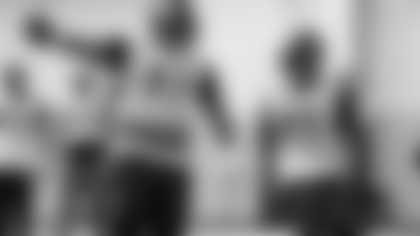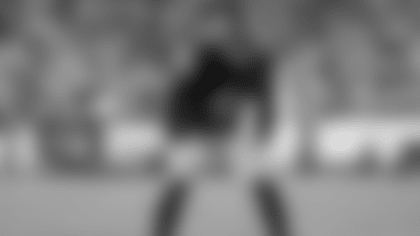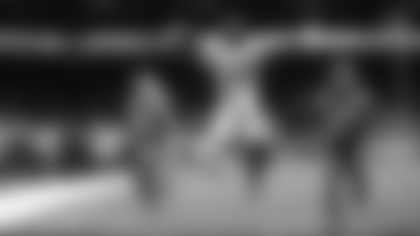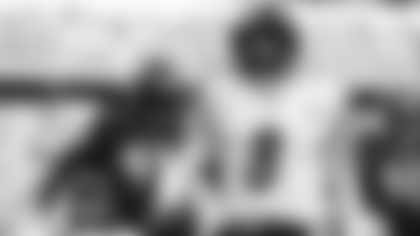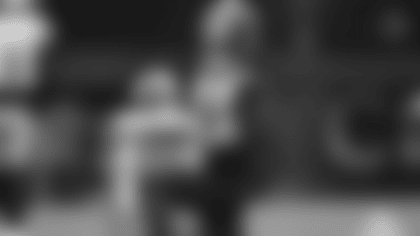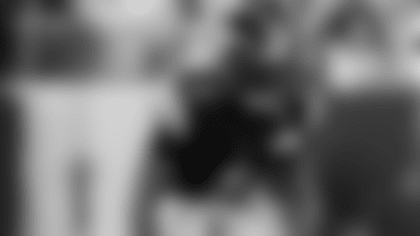Q. How has the strategy of getting through the preseason finale changed as a result of teams now having what amounts to almost a bye-week-and-a-half between the end of the preseason and the start of the regular season?
A. It doesn't change at all for us. I'd imagine each organization addresses it a little bit differently. We play the three-game preseason schedule the same way we played the four-game preseason schedule in that the same things that we were trying to get done in game three on a four-game schedule are the same things that are really largely on our agenda in the three-game schedule. So what are we losing with no fourth game? The fourth game is usually an opportunity to determine the last few spots on the team, and usually that's played out in the form of special teams. I think about Stefan Logan running his way onto our football team in Carolina with a big punt return down there in the fourth game. And so, we've weighed that component of it, and we've really worked our tails off to provide more special teams opportunity in scrimmage-like play and practice, and we'll continue to do so in an effort to balance out that component of it to give those guys a platform to show their skills and make necessary decisions relative to the last remaining spots on the roster.
Q. I'm not going to ask if you like having 16 days between the preseason finale and the regular season opener, but what do you envision being the best use of that time?
A. You know, it really depends on the state of your team. I've put a couple of templates down because you just never know. Every time you step into a stadium, your intentions could change based on health and availability. If you've got a healthy football team and a competitive environment as you push forward toward 53, then you continue to do scrimmage-like things in an effort to provide them opportunities to sort themselves out. If you're leaking a little bit you work smart and work to get work done as you push forward towards your opener without absorbing any more negativity. And so I think that's the spirit in which we're moving. We're singularly focused on the opportunity that is this game. We've got a couple of templates on how we're going to address the other side of (this game), but we respect what happens in this stadium. And we won't make any final decisions on what that looks like until we step out of this stadium.
Q. How early can you start the process of preparing for the 49ers and have it be meaningful?
A. I've been preparing for it since the schedule came out. I guess what you're asking is what's the difference between coach preparation and before we start presenting it to the players, and it just doesn't behoove us at this juncture to present it to players. You know, we're just too far out. There are more immediate things that are Steelers vs. Steelers relevant in terms of distinguishing the 53, and so we'll continue to get focused on that process with this group, all the while acknowledging as professionals in our business that the coaches are looking ahead and gathering information and making strategic plans.
Q. OK, tonight's game ends, the preseason Is over, and you're on the plane heading back to Pittsburgh. Starting at that moment, what will the next 72 hours look like for you in terms of a to-do list?
A. Deciding on a calendar. As I mentioned, we've got some templates of how we want to go about that time period. I'll decide on the calendar based on our needs, and our needs being the opportunity to sort themselves out and balance with the health of the collective group. And then we'll plan strategically. What that block of time looks like, how we're going to work, what attire we're going to be in, what drills or opportunities that we're going to present to them in an effort to provide quality work.
Q. So you aren't going to look at it that since chronologically the first thing to happen is cutting the roster to 53, that's what I'm going to work on first?
A. You know, there's no need to cut the roster until you have to cut the roster to be quite honest with you. You could be making strategic plans relative to that decision, but no need to turn in the scorecard early. So those decisions are kind of ongoing. That mindset in terms of what our 53 might look like and how we divide the labor up, I'm processing that as we speak. But in terms of decision making, you know, it has been our general principle or approach that there is no need to make those types of decisions until you have to.
Q. Pending tonight's game against the Falcons, how would you assess your situation at backup center?
A. We're really comfortable with the number of candidates we have. We've got some guys with real NFL experience there. Nate Herbig has been a guy who's played center at this level. Kendrick Green is a guy who has been a starting center at this level. We've got a couple of other guys who are center-capable. Ryan McCollum is center-capable. Spencer Anderson is center-capable, and so we've probably got more depth in terms of guys who are capable and also more depth with guys with experience than I can recall.
Q. Would you go into the regular season with a backup center who had not played the position for you at least in a preseason game?
A. If I had to, certainly. If he's got larger experience that makes me comfortable, and I've seen things within the practice setting that makes me comfortable, then certainly.
Q. When a player is said to have "heavy hands," what does that mean.
A. It means he's capable of moving people when he places his hands on him. That he can manipulate space, that he can hold ground. It usually centers somewhere around physical confrontation.
Q. So the meaning is different for offensive lineman vs. defensive linemen?
A. It's different because of their job description being different, but relatively speaking, it's a similar skill-set.
Q. So heavy hands for an offensive lineman means he punches in pass protection? If you do that during run blocking isn't it holding if you direct someone with your hands?
A. The strike is what you're talking about when you're talking about heavy hands. And so that's the initial punch, and that is always useful.
Q. A special teams question: What determines how far behind the line of scrimmage a punt returner lines up before the ball is kicked?
A. Scouting. You know, reputation and resume of the punter, the things that you witnessed on site during pregame, environmental things such as wind. And obviously, circumstances. Sometimes field location could dictate a certain alignment. With red-zone punting, you put his heels at a prescribed depth regardless of some of those other variables. And so that's the checklist, if you will, that you go through in terms of determining where he aligns.
Q. If that returner is too far back and the ball bounces in front of him, is that the returner's fault?
A. No, it's usually the fault of the punter, but sometimes punters benefit from that because of the roll. There's so much information out there in preparation for games. In today's game, oftentimes when that ball bounces in front of the returner, it's almost always punter negligence.
Q. For six seasons from 2015 through 2020, you had a West Point graduate who played a lot of offensive line for you by the name of Alejandro Villanueva. Tonight, safety Elijah Riley will be using tonight's game in trying to win a roster spot as a defensive back, and he also graduated from West Point. How are service academy graduates different from other players, beyond the physical skill-set?
A. You know, I think that experience obviously shapes them in a special way. That is a special place. That's West Point. I'm familiar with it because I have a nephew who's there right now, so I know what they look like when they go there, and I know what the transformation process looks like from a personality standpoint or how an individual's attitude toward life changes. I'm sure it not only helps them in football, it helps them in all aspects of their life. It legitimately is a transformation.
Q. So when you're working with such an individual, is he more goal-oriented, more team-oriented? Are they more buttoned-down in the way they approach their business and their daily life?
A. Most certainly, relative to what they used to be. The thing about it is I didn't know what their baseline was, and so it's just normal interactions for me. I have a level of appreciation and knowledge about what that place does, again because of my nephew, but I don't know what those two guys in particular looked like on the preceding side of it.
Q. But is a Service Academy graduate different from an SEC player?
A. I would imagine there are some differences between the guy from West Point and a Georgia Bulldog on a lot of fronts. I don't know about George Pickens on the Hudson (laughs).
Q. Is cutting the roster from 90 to 53 the worst part of your job every year?
A. I don't necessarily view it that way. I guess my perspective on it has changed over the years. It's very much a necessary part of this process and what we do, and I pride myself in being really transparent and giving these guys enough information to do what capable men are capable of doing. And so it's just that. It's the process. I feel comfortable with it provided that I educate, that I provide a platform for guys to improve and show their skills and then that we're strong enough and clear-eyed enough to just call it as it as it is as opposed to the way we want to see it. And so I'm comfortable with it. It's a necessary component. I've grown to appreciate this time of year because of the anticipation associated with what's on the other side of it.
Q. You always say your job is to be what the team needs you to be. What do the players involved need from you to be in that moment?
A. Different guys need different things. Some guys, you know, it's a short conversation. They don't want to talk extensively about it. Certain guys need professional information or guidance. Some guys need emotional support. It just depends on the individual. But usually none of it is a surprise. Usually that conversation is a culmination of a relationship and of work that's been ongoing for months
Q. Do you every get any push-back from a player when you give him that news? For example, might a guy say, "You're keeping this guy and this guy, and I'm better than both of them?"
A. No. It's almost always singularly focused on them, and that's really as it should be. If you're looking around in this process, you're dead. In this process, you better focus on you and what it is that you do and the quality with which you do it.



